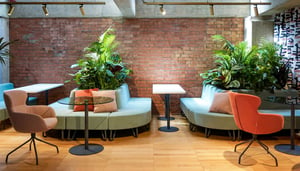Crafting a Sense of Belonging: The Crucial Role of Office Design in Talent Retention
According to research by McKinsey, nearly 40% of employees reported being somewhat likely ...
Designing Tomorrow's Office: Responding to the UK Workforce's Need for Productivity Boost
According to the Gensler 2023 report on UK Workplaces, the number of hours spent by UK ...
JPA Workspaces celebrate King’s Award at Buckingham Palace
We’re delighted to have been awarded The King’s Award 2023 for Enterprise in Sustainable ...
JPA Workspaces win prestigious King’s Award for Sustainable Development
We are thrilled to announce that JPA Workspaces have been honoured with one of the first ...
What are biodiversity stripes?
‘Biodiversity stripes’ provide a visual representation of the change in biodiversity over ...
Five key priorities for laboratory furniture
Laboratories have been the birthplace of countless scientific innovations that have ...
What does 'sustainability' mean?
National Geographic magazine has a succinct definition of sustainability: “Sustainability ...
Getting Creative with Circular Furnishing Services
We are huge advocates of the circular economy and we freely admit we do talk about it ...
How to retain talented staff as well as attract new talent
‘Our people are our greatest asset’ is a mantra that many businesses quote but not every ...
Sustainable Development Presentation at TP Bennett
Blaze and Fiona have been in London this week, giving a breakfast presentation to ...
How to keep different generations of workers happy in their office environment
There has been a lot in the news about the different generations - most people are ...
The Value of Sustainable Office Furniture
With a greater focus on the environment, more and more people are looking to buy office ...
